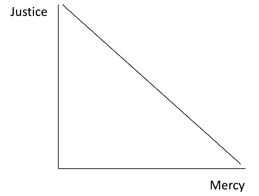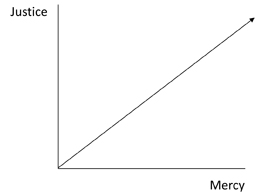The next occurrence of Son of God (υἱοῦ τοῦ θεοῦ) in John’s Gospel is found in verse 18 of the third chapter.
|
KJV |
NAS |
NET |
|
| 3:18 | He that believeth on him is not condemned: but he that believeth not is condemned already, because he hath not believed in the name of the only begotten Son of God. | “He who believes in Him is not judged; he who does not believe has been judged already, because he has not believed in the name of the only begotten Son of God. | The one who believes in him is not condemned. The one who does not believe has been condemned already, because he has not believed in the name of the one and only Son of God. |
The first thing I noticed here is that the KJV has believeth on the Son of God where the NAS and NET have believes in the Son of God. The Greek word is εἰς[1] which is to or into. Believe into the Son of God is an interesting image of entering in to the Son of God or the life of the Son of God, everyone who believes in (εἰς) him will…have eternal life.[2] In Romans 10:11 below the Greek word is ἐπ᾿ (a form of ἐπί)[3] which is on or upon, but the NAS and NET translators still rendered it in.
|
KJV |
NAS |
NET |
|
| 10:11 | For the scripture saith, Whosoever believeth on him shall not be ashamed. | For the Scripture says, “WHOEVER BELIEVES IN HIM WILL NOT BE DISAPPOINTED.” | For the scripture says, “Everyone who believes in him will not be put to shame.” |
This is also an interesting image of resting upon the Son of God: He is like a man building a house, who dug down deep, and laid the foundation on (ἐπὶ) bedrock.[4] Apparently the translators picked one of these two images and stuck with it.
Again, in John 3:18 κρίνεται (another form of κρίνω[5]) was translated condemned in the KJV and NET and judged in the NAS. Whatever God did not send his Son into (εἰς) the world to do in verse 17 was not done to the one who believes in (εἰς) Him. The one who does not believe has been condemned already.[6] The Greek word translated condemned in the KJV and NET and judged in the NAS is κέκριται (another form of κρίνω). So whatever God did not send his Son into (εἰς) the world to do is done already to the one who does not believe…because he has not believed in the name of the one and only Son of God.[7] So what is it that God did not send his Son into the world to do, that was not done to those who believe in the Son of God, but done already to those who do not believe? Here is where the three translations diverge.
|
KJV |
NAS |
NET |
|
| 3:19 | And this is the condemnation, that light is come into the world, and men loved darkness rather than light, because their deeds were evil. | “This is the judgment, that the Light has come into the world, and men loved the darkness rather than the Light, for their deeds were evil. | Now this is the basis for judging: that the light has come into the world and people loved the darkness rather than the light, because their deeds were evil. |
In the KJV and NAS the condemnation or judgment that God did not send his Son into the world to do, that was not done to those who believe in the Son of God, but was done already to those who do not believe was that light is come into the world, and men loved darkness rather than light (KJV), and that the Light has come into the world, and men loved the darkness rather than the Light (NAS) respectively. In the NET the condemnation is not clearly defined, only that the light has come into the world and people loved the darkness rather than the light is the basis for making an unspecified condemnation (or, judgment, as the case may be).
Here the Greek word is κρίσις.[8] The translators of the KJV and NAS treated κρίσις as if it were the noun of the verb κρίνω. The translators of the NET did not. The translators of the NET are probably about my age. I assume they were socialized into a gospel similar to mine: believe in the Lord Jesus Christ or burn in hell for all eternity. Their translation of John 3:16-19 certainly supports that gospel. The unspecified condemnation, then, would be to burn in hell for all eternity. It is just; it is justice because light has come into the world and people loved the darkness rather than the light. In other words, Jesus has been here and gone and people prefer their sins to Jesus’ righteousness. Why are people like this? Because their deeds [are] evil. So people loving darkness rather than light when light has come into the world is a basis for judging them. It makes perfect sense relative to the gospel I was socialized into, but is it what the Scripture says?
I was surprised to discover that John 3:1-15 didn’t necessarily support[9] “believe in the Lord Jesus Christ or burn in hell for all eternity.” But I could let it go because I was confident that John 3:16-21 was completely clear on the matter. Now that confidence is shaken and it is that much more difficult for me to let go. Every thought, every word comes slowly. But I will consider the alternative implications of κρίσις being the noun that is equivalent to the verb κρίνω.
| “For God did not send the Son into the world to judge (κρίνῃ, another form of κρίνω; NET condemn) the world…”
John 3:17a (NAS) |
“Do not judge (κρίνετε, another form of κρίνω) so that you will not be judged (κριθῆτε, another form of κρίνω). For by the standard you judge (κρίνετε, another form of κρίνω) you will be judged (κριθήσεσθε, another form of κρίνω), and the measure you use will be the measure you receive.”
Matthew 7:1, 2 (NET) |
| Now this is the basis for judging (κρίσις): that the light has come into the world and people loved the darkness rather than the light, because their deeds were evil.
John 3:19 (NET) |
Speak and act as those who will be judged (κρίνεσθαι, another form of κρίνω) by a law that gives freedom. For judgment (κρίσις) is merciless for the one who has shown no mercy. But mercy triumphs over judgment (κρίσεως, a form of κρίσις).
James 2:12, 13 (NET) |
In this round I began with the NAS translation, “For God did not send the Son into the world to judge (κρίνῃ; NET condemn) the world…”[10] The word κρίνῃ (a form of κρίνω) was only used once in the New Testament. I can’t say that judge is a better translation than condemn. I can only observe the symmetries if judge were accepted as the better translation. If the Father did not send his Son into the world to judge the world, then it makes perfect sense that Jesus taught his disciples not to judge: “Do not judge (κρίνετε, another form of κρίνω) so that you will not be judged (κριθῆτε, another form of κρίνω). For by the standard you judge (κρίνετε, another form of κρίνω) you will be judged (κριθήσεσθε, another form of κρίνω), and the measure you use will be the measure you receive.”[11]
The Greek words κρίνετε, κριθῆτε and κριθήσεσθε are also forms of κρίνω and are translated do judge and you judge, and you will be judged in the NET. The negation comes from Μὴ[12] in the first instance of κρίνετε (Μὴ κρίνετε, Do not judge) and μὴ κριθῆτε (you will not be judged [‘Μ’ is the uppercase and ‘μ’ the lowercase of the letter ‘mu’ in the Greek alphabet]). And this is a “qualified negation” according to Strong’s Concordance as compared to the “absolute denial” of οὐ,[13] the negation used in God did not (οὐ) send his Son into the world to condemn (or, judge) the world,[14] and, The one who believes in him is not (οὐ) condemned (or, judged).[15]
It also makes sense to me that Jesus’ half-brother James would have a handle on judging, judgment and mercy from growing up in the home with his elder brother, while Paul the former Pharisee had to learn that lesson sometime after he wrote 1 Corinthians 5 and before Galatians 6:1-5. Another thing worth noting is that the NET translators treated κρίσις as if it were the noun for the verb κρίνεσθαι (another form of κρίνω): Speak and act as those who will be judged (κρίνεσθαι) by a law that gives freedom. For judgment (κρίσις) is merciless for the one who has shown no mercy. But mercy triumphs over judgment (κρίσεως).[16] And finally, κρίσις was translated simply judgment. There is nothing intrinsic to the word ending that justifies translating it the basis for judging in John 3:19 (NET).
[9] I tell you the solemn truth, unless a person is born of water and spirit, he cannot enter (εἰσελθεῖν) the kingdom of God (John 3:5 NET), may provide support for “believe in the Lord Jesus Christ or burn in hell for all eternity.” On the other hand it may have been Jesus’ way of turning a phrase when Nicodemus said, He cannot enter (εἰσελθεῖν) his mother’s womb and be born a second time (John 3:4 NET).
[11] Matthew 7:1, 2 (NET) Table


